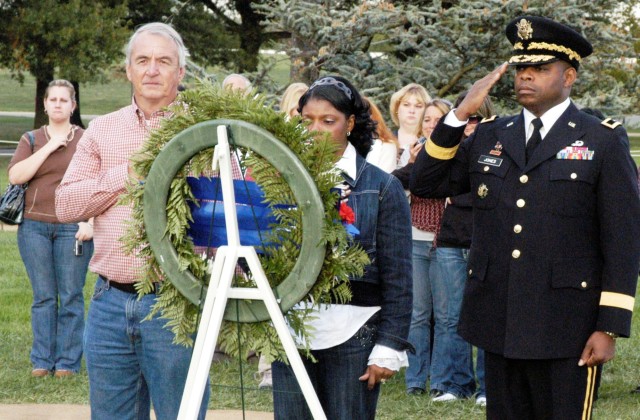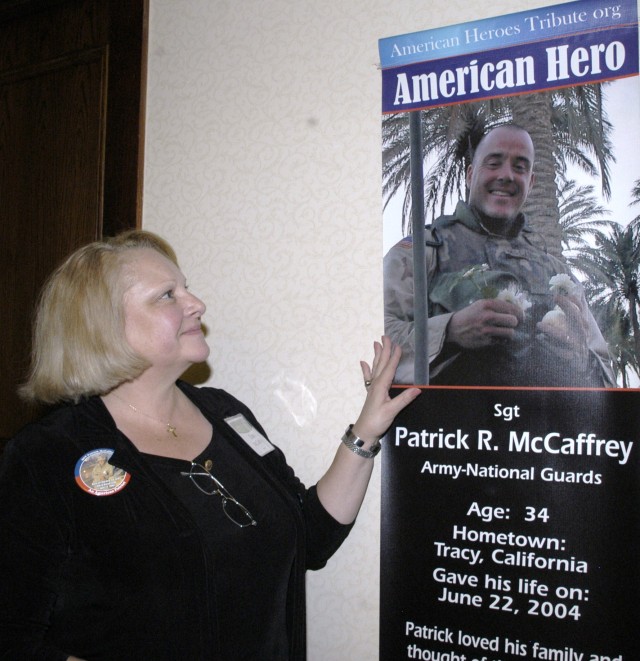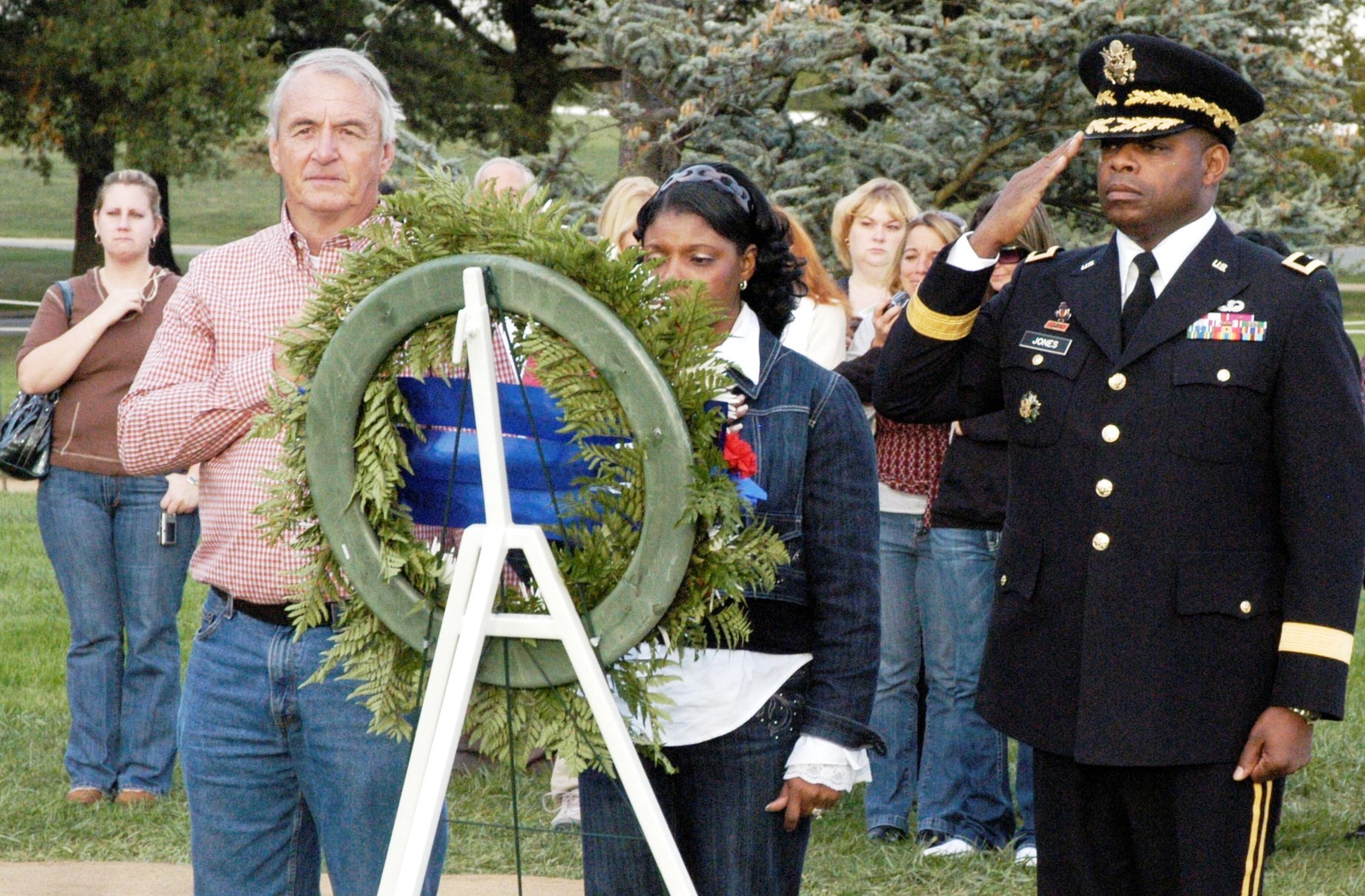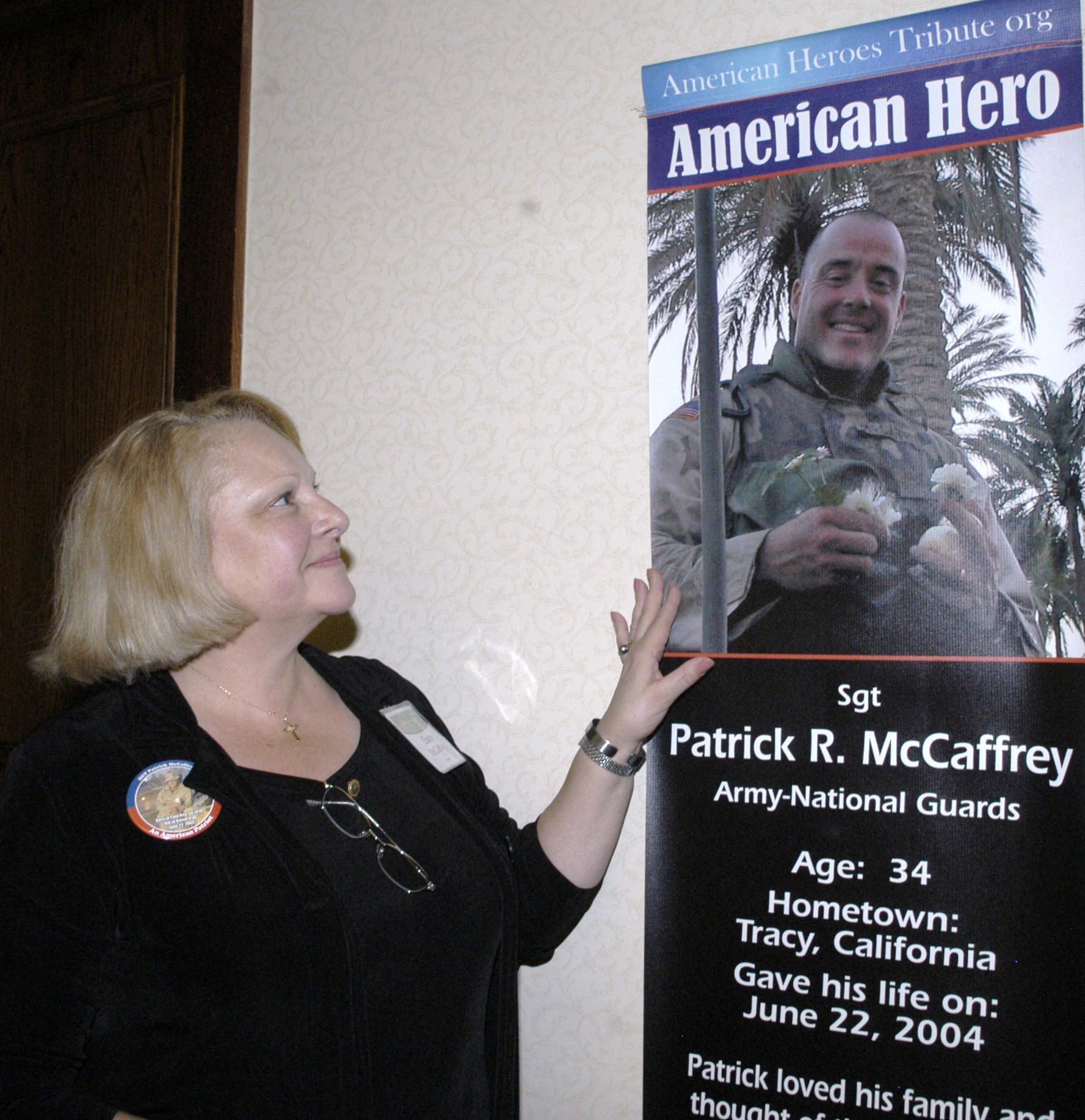ARLINGTON, Va. (Oct. 16, 2009) -- About 55 survivors of fallen warriors traveled from Germany and points across the United States earlier this month to discuss and evaluate the progress Survivor Outreach Services has made.
The theme for this year's SOS summit represented both the process of grief and an assessment of how well the one-year-old organization is addressing the needs of survivors: "Embracing Our Survivors Along the Journey...Are We Making a Difference'" Attendees included parents, spouses, adult children and uniformed survivors of active Army, National Guard and Reserve warriors.
On hand to hear their concerns were Army Chief of Staff Gen. George W. Casey Jr. and Army Vice Chief of Staff Gen. Peter W. Chiarelli. Donna Engeman, survivor advisor to the Army's Family and Morale, Welfare and Recreation Command's survivor's services, opened the summit Oct. 7.
"You are always part of the Army family for as long as you want to be, and at this summit you now have the chance to voice your opinions, suggestions and concerns," Engeman said.
Engeman, herself a survivor and a dedicated Army spouse for 23 years, lost her husband, Chief Warrant Officer John Engeman, when he was killed in May of 2006 in Iraq. She became active in helping the Army improve its support system for survivors of fallen servicemembers when she was at the Pentagon for a Gold Star Remembrance ceremony in 2007.
"I was standing in the hallway and thinking to myself, 'if I ever get a chance to tell the Army what I think...' and suddenly I found myself standing alongside of Gen. Casey, so I told him in so many words that this whole casualty assistance process stinks," Engeman said.
She turned to walk away figuring he would just go fix it.
"Don't walk away," Casey called out to her. "You're going to help me."
"About a year later, two weeks after beginning work as survivor advisor for the FMWRC, I suddenly found myself being asked by Sheila Casey, the general's wife, to deliver a presentation on Survivor Outreach Services. She didn't listen to my protests that I had never spoken to a large group before.
"You just don't say no to those two," Engeman laughed.
Brig. Gen. Reuben Jones, commanding general of the Family and MWR Command since July, served previously as the adjutant general for the Army. In that position, the Casualty and Memorial Operations Center, or CMOC, fell under his command.
"In my former life, I spent many hours over at the casualty operations center and I remember many of your Soldiers. It gives us no greater pleasure than to serve you all and over these next three days we will listen to you and try and fix what's not working. If we can't, then the Defense Department will, and if they can't, it will go to Capitol Hill.
"To help make these changes a reality, our special advisory panel, made up of four surviving spouses and one surviving father: Donna Engeman, Dana Lambertson, Kristy Stanley, Kristen Fenty and Robert Stokely, meets quarterly," Jones said. The group was selected by Gen. Casey.
"I call on this crew to tell me which paths to take, and although they serve a two-year term and we'll be looking for replacements, their involvement will never expire because Army leadership needs all the help they can get to work your issues and concerns," Jones said.
For spiritual guidance at the summit, Chaplains Lt. Col. Thomas C. Waynick of FMWRC and Lt. Col. Michael Strohm from the Pentagon gave a presentation on dealing with grief. They asked each table to answer the questions: what do you wish everyone knew about the grief of survivors' What is the best thing the Army can do for survivors' And, what is the best thing you can do for each other'
Casey, after a few brief statements, was inundated with concerns from survivors - concerns he does not take lightly. One issue in particular caused him concern.
"We have to change the way the nation thinks about survivors and about the parents of survivors," Casey said. "I was talking to a mom and dad who had lost their son and they told me that no one has talked to them. [The Soldier's spouse was the recipient of the support.] That is wrong."
"I work with Gold Star parents, many of whom are being ignored," Nadia McCaffrey, said. Founder of the Patrick McCaffrey Foundation, named for her son, Sgt. Patrick McCaffrey with the National Guard, killed in Iraq, June 2004.
"Robert Stokely is on our panel because he's a surviving father. This issue will be addressed," Casey said.
Katrina Rojas, a surviving wife from Fort Lewis, wanted to know why the military escort, her husband's friend, wasn't allowed to accompany him back home.
"My husband and his best friend agreed to escort the other home. The paperwork was signed, but when we heard the news, another Soldier escorted him. Our hearts were broken. Why were we given a form that wasn't followed through on'" Rojas asked.
Krystal Michelle Chaney wanted to know why the Army waited so long to inform her about her husband's death.
"SOS at Fort Sill, Okla., asked me to be here today. My husband was killed in a state-side traffic accident and I wasn't notified until 18 hours later."
The notification processes need to be revised, Chaney said.
"Casualty office processes have a responsibility to notify the correct people at the appropriate time. The casualty officer in the situation needs to be very aware and clear as to who the PADD (Person Authorized Direct Disposition of Remains) is in the situation," she said.
Her loss illustrates a new issue to be addressed: the families of stateside casualties caused by catastrophic incidents should be treated the same as survivors of those killed in action or other combat-related deaths.
"Widows of stateside incidents should never be physically put to the side while a widow of a KIA death is given preference, as was my personal experience," Chaney said.
Ed Brown, a surviving father in Troy, Ala., revealed how his family was treated when their son was brought home.
"My son was killed two weeks after he landed in country," Brown said.
We knew he would arrive in the states at some point, but we weren't notified until one and a half hours before his body landed at Dover Air Force Base. From there he was sent to Montgomery, Ala., where my wife and I weren't allowed onto the tarmac to see our son come off the plane and down a conveyor belt."
"Our son was treated like a piece of luggage," his wife, Bonnie, added.
Visibly moved, Casey mentioned the movie, "Taking Chance," an HBO film based on the true story of Lance Cpl. Chance Phelps who was killed in Iraq, April 2004. The film bears witness to the fallen and those who carry him home.
"This film represents how we treat the fallen, now, and I'm sorry you had to go through that," Casey told the parents.
Engemen's son, Patrick, a captain in the Army who went to Iraq 12 weeks after his father died, and who left again to Iraq following the summit, brought up one issue that resonated throughout the room. The Army, he said, doesn't follow those who aren't beneficiaries. But many surviving service men and women continue to serve.
"Wouldn't you want to know if a survivor was in your unit," Patrick asked' "All I ask is that the Army keeps track of us."
Laura Wolf of Houston, Texas, a mother at the summit, mentioned how her son had committed suicide.
"My first military son came back from the war very different than when he went," she said. "For two years, the doctors misdiagnosed him, ruling out post traumatic stress disorder and calling it a personality disorder. He tried self medication until committing suicide."
Another survivor recalled how a parent told her she was not allowed to sit with the Gold Star mothers because her son was not killed in combat, but committed suicide.
Gen. Peter W. Chiarelli, Army vice chief of staff, listened as spouses and parents around the room told their stories of suicide in the military.
"My job is to cut the number of suicides, which is more about mental wellness of force Soldiers and families. I lost 168 Soldiers to combat and one to suicide," Chiarelli said. "For this one Soldier, I made the biggest mistake of my life when I didn't allow his name to be placed on the Honor Wall."
Chiarelli says he is now trying to get Soldiers to understand that traumatic brain injury and PTSD are both real, and that the stigma - which some Soldiers feel will end their career if they seek help -- is a major issue that needs to be resolved.
"With eight years of war in two theaters and more deploying, I need to stand and speak up for the Soldier. Consequently, I'm like a scud missile. Communicate anything with me and I'll try to get something done," Chiarelli told the parents, spouses and children of survivors.
Casey, himself a survivor who lost his father, Maj. Gen. George W. Casey, in Vietnam in 1970, echoed Chiarelli while calling out for more help.
"There is clearly and rightly a lot of pain in this room, but solutions aren't going to happen overnight. As you leave this summit, spread your arms and bring in others. Obviously, the issues we've heard means we haven't been doing enough for our survivors," Casey said.
During the second day of the summit, attendees were invited to visit Arlington National Cemetery.
"Gen. Chiarelli offered us the opportunity to visit Arlington National Cemetery. He and his staff work with ANC folks, so they came up with this wonderful program for our summit attendees," Engeman said.
Survivors Janae Sturgis and Ed Brown, along with Brig. Gen. Reuben Jones, laid a wreath in a special ceremony in Section 60, where most of the fallen from Iraq and Afghanistan interred in Arlington have been laid to rest.
(Rob McIlvaine writes for FMWRC Public Affairs.)




Social Sharing